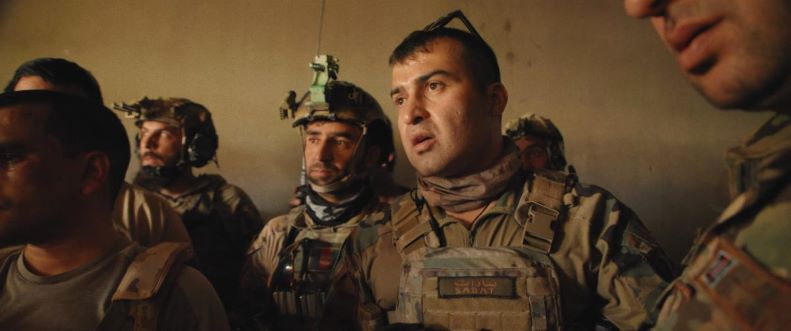In 2019, Oscilloscope released Combat Obscura, a documentary by Miles Lagoze, a soldier who served in Afghanistan and between 2010 and 2011 acted as the videographer for his unit. The result is as maddening and horrifying as one would expect, with some scenes being violent, others painfully acute portraits of the trauma of those who serve. One especially chilling scene involves a group of soldiers breaking up a religious meeting they mistake for a Taliban gathering, and while no one is hurt, it is hard to watch and maintain any faith in military actions abroad, if that faith was there at all.
Three years later, National Geographic has released Retrograde, a more highly wrought film that chronicles the process, and the aftereffect, of President Biden’s decision to pull the U.S. military out of Afghanistan in 2021. Filmmaker Matthew Heineman had access to both the American Green Berets and the Afghan Army during an eight-month period, giving him, perhaps, a unique perspective.
The story is clearly told and progresses at an even, measured pace. We watch the American and Afghan officers in meetings, and carry out operations from Camp Shorab in Helmand Province. As a result of Biden’s announcement that U.S. forces will be leaving the country—which some of top U.S. military brass see as inevitable, while others voice concerns—a retrograde plan to handle the withdrawal is deployed. After the U.S. advisors depart, the Afghan military tries to handle an increasingly chaotic and dangerous situation, and viewers are privy to much of the same sort of scenes: meetings, interviews, and the like. Though multiple perspectives are offered, the person Heineman stays with the most is Lt. Gen. Sami Sadat, who was trained to fight the Taliban by the U.S. military. His stake in the matter is clear: He does not want the United States to leave, believing its support necessary to ensure an Afghanistan that is free of the Taliban. Watching him deal with the fallout of Biden’s decision is one of the more painful parts of the film.
Its message is clear: The United States should not have left, and, in fact, cruelly abandoned Afghanistan to the hands of the Taliban. I don’t take issue with that per se. However, though Heineman was indeed privy to rare company, and filmed his subjects in some very dangerous situations, much of what we witness seems heavily controlled. Some of the U.S. personnel are so measured and collected when they speak, they sound like social workers. Whether or not you object to the message is not the point, since this is a film that, regardless of what it’s telling us, gives the impression that it is smoothing away inconvenient edges.
Even after we’ve seen the bombing of Taliban targets and the chaos at the Kabul airport, we have the sense that there are questions this film fails to examine. While it is justly critical of the U.S. mismanaging its exit from Afghanistan, it has almost nothing to say about America’s presence there in the first place. Though one could argue it is out of the film’s scope to do so, it really isn’t. This is a question that you really need to confront when thinking about the war in Afghanistan. If anything, the past 20 years or so should have taught us that U.S. intervention is not always welcome, and often destroys more than it saves. There is a brief, early sequence in which a soldier calmly issues the importance of correctly identifying the Taliban so that innocent people are not killed. Otherwise, this is an idea alien to Retrograde. When America intervenes, it is for a good reason, and this assumption is implicit. The nihilistic chaos of Combat Obscura is nowhere to be seen. The soldiers here would never mistake a religious observance for a Taliban meeting.
The U.S.’s 20-year war in Afghanistan is one of the chief quagmires of this young century, and it demands filmmakers who are willing to wrestle with its full complexity. Maybe, one day, we’ll get one.







Leave A Comment